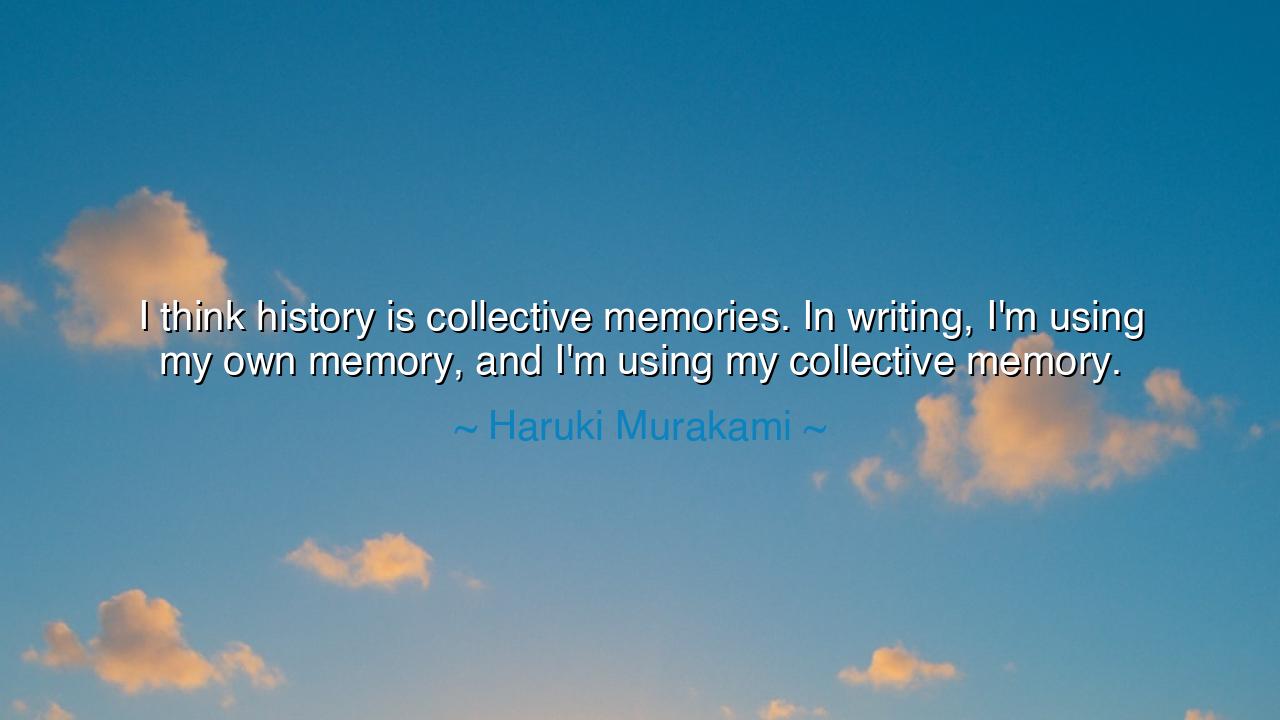
I think history is collective memories. In writing, I'm using my
I think history is collective memories. In writing, I'm using my own memory, and I'm using my collective memory.






“I think history is collective memories. In writing, I'm using my own memory, and I'm using my collective memory.” — Thus spoke Haruki Murakami, the quiet dreamer of words, whose stories flow between the personal and the universal, between the solitude of one mind and the heartbeat of humanity itself. In these simple words lies a profound truth: that history is not merely the record of nations or kings, but the shared memory of the human soul. Each life, each thought, each sorrow and joy, becomes a thread woven into the great tapestry of existence. And through art, through writing, through remembrance, those threads intertwine — the individual becoming the collective, and the collective living on within the individual.
When Murakami speaks of collective memory, he reminds us that no one stands alone in time. Every person carries within them echoes of generations past — the laughter of ancestors, the grief of wars, the hopes of revolutions, the whispers of forgotten songs. Even if we do not know their names, their experiences shape the soil from which our hearts grow. To write, then, is not merely to tell one’s story; it is to awaken the stories sleeping in the blood of all who came before. For the individual memory is but a door through which the collective memory walks.
This truth can be seen in every culture that treasures its myths and legends. Consider the ancient Japanese tradition of oral storytelling — the folktales of spirits, heroes, and lovers who transcend time. These were not inventions of one mind, but the living voice of a people, carried from generation to generation. When Murakami writes of loneliness, of memory, of the mysterious harmony between dreams and reality, he draws from that same well — the shared unconscious of his nation, shaped by war, loss, and rebirth. Thus, even his most personal stories are never private; they are mirrors in which many souls see their own reflection.
History, then, is not only written by scholars and kings — it is lived, felt, and remembered by ordinary people. When a mother sings to her child, when an elder recalls the past to the young, when a poet captures a fleeting moment of love or despair — all these become part of the collective memory that defines a culture. Murakami teaches us that to remember is to participate in history itself. For memory is not passive; it is an act of creation. Through remembering, we keep the dead alive, we give meaning to suffering, and we ensure that the wisdom of ages is not lost to silence.
Think of Anne Frank, a single young girl hidden away during a time of darkness. Her diary was her memory — personal, tender, unguarded. Yet through her words, millions have come to feel the heartbeat of her era, the fear and the hope of an entire people. Her individual memory became the collective memory of humanity, a beacon that reminds us of both the fragility and the resilience of the human spirit. So too does every act of remembrance, whether written in books or carved in stone, weave the private into the eternal.
Murakami’s insight carries both wisdom and warning. He reminds us that collective memory can heal — but it can also divide. A society that forgets its past risks losing its soul; yet one that clings to its wounds without forgiveness remains forever in chains. Therefore, to remember rightly is to seek balance — to honor the truth of what was, while still believing in what can be. Through stories, through art, through honest reflection, humanity learns not only to recall its pain, but to transform it into meaning.
Let this be your lesson: cherish your own memories, but understand that they are not yours alone. You are the vessel of a greater story — of family, of culture, of humanity. When you speak truthfully, when you create, when you live with awareness, you add your voice to the timeless chorus of history. The past is not distant; it breathes within you. The faces of ancestors look out through your eyes. Every act of kindness, every word of courage, every moment of reflection — these become part of the collective memory that shapes tomorrow.
So write, remember, and listen. For in the stillness of memory lies the song of eternity. History is not a book of the dead — it is a living river that flows through each of us, carrying our joys and sorrows into the sea of all that has been and all that will be. And as Haruki Murakami reminds us, when we remember, we do not simply look back — we become part of the story that never ends.






AAdministratorAdministrator
Welcome, honored guests. Please leave a comment, we will respond soon